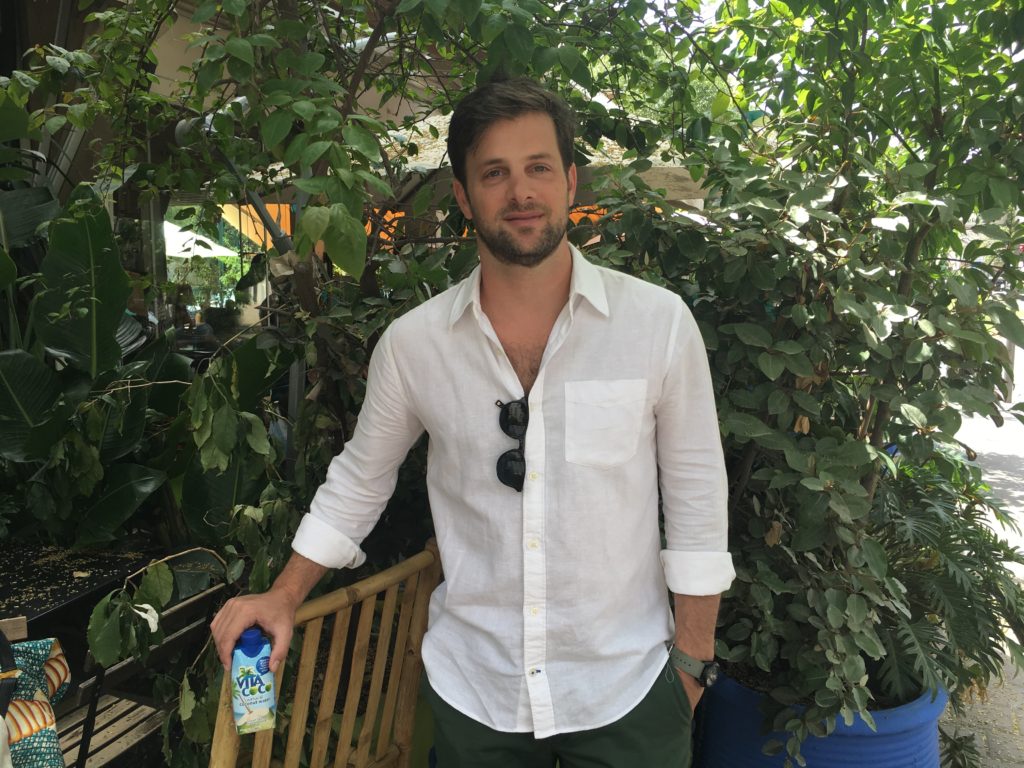Jerusalem Post Magazine, May 6, 2016
For the online version (for subscribers), click here.
For the PDF version, click here.
The genesis of Ira Liran’s Vita Coco coconut water empire is starting to sound a bit like a corny joke.
Two Jewish guys walk into a bar. They spot two hot Brazilian girls and strike up a conversation. The girls ask: “Do you want to see our coconuts?” The two Jewish guys look at each other, giddy as schoolboys, and then shift their gaze elsewhere. The Brazilian girls slap them, and then say: “We mean our coconut water!” Okay, so this fateful 2003 bar encounter didn’t happen like that. The subject of coconuts had come up when Ira Liran and his best friend turned business partner, Michael Kirban, asked two Brazilian women they met in a New York bar what they miss most about their motherland.
Coconut water is to Brazilians what hummus is to Israelis: a staple for breakfast, lunch and dinner. In Brazil, this electrolyte-rich, refreshing, tropical beverage is served in fast-food chains, restaurants, bars, and out in the streets, machete-style, where vendors hack green coconuts at the top, insert a straw and voilà: nature’s elixir in an organic bowl. (Then use the hacked lid as a spoon to scoop the flesh.)
Soon enough Liran, then a recent graduate of Columbia University in Italian cinema and cultural studies, went on to prove that fortunes can be born in pick-up bars.
“I started dating that girl and basically weeks later I moved to Brazil with her,” Liran told theMagazine at a cafe in Tel Aviv, pleased to be back in his motherland, his sun-kissed hair and white linen shirt hinting at the good life in São Paulo, where he has made his home with his wife (no, not that girl from the bar). “You’re 24 and live on the fly like that. I packed up my two suitcases and moved to Brazil. When I got there I was looking for a business that would sustain myself.”
The business he conjured up now sustains some 400 full-time employees and twelve factories in eight countries in South America and the Southeast Asian tropics, globally cracking open two million handpicked coconuts a day. Vita Coco is the American leader, dominating close to 50 percent of the $1.2 billion US market, followed by Coca-Cola’s Zico and PepsiCo’s O.N.E. Vita Coco is distributed in the US by the Dr. Pepper Snapple Group.
BORN IN Ramat Gan in 1978 but having moved to New York with his parents at age two, Liran comes to Israel biannually to visit his grandmother in Jerusalem and cousins, aunts and uncles in Rehovot, where they all enjoyed coconut water at the Seder table.
“I used to come here with two suitcases and one of coconut water just for my family. And they’d gobble it up. Now I don’t have to bring any.”
He timed his Passover visit with the Israel launch of Vita Coco, his 31st global market and among his more meaningful. His Israeli roots go back generations; his grandfather Yeshayahu Anug served as Israel’s ambassador to several countries.
“Every day I follow what’s happening here. Israel is in my heart. Spiritually, mentally, physically, I try to be here as much as I can.”
On the business side, Israel is an ideal market, especially in the sticky summer, as it constitutes Vita Coco’s target destination: “points of sweat” (and sometimes, as in Tel Aviv’s case, “points of hangover”).
Israelis are not unfamiliar with the drink. This wanderlust population has grabbed it on the streets of Bangkok and Goa, machete-style. What Liran realized back in 2003 as a new immigrant to Brazil was that packaged coconut water could be a hit in the US.
He and Kirban (today CEO of the company) pooled their joint $50,000 savings to ship two containers of 100,000 Tetra- Pak juice boxes to the US Port of Entry at Newark. But the Ivy League grad didn’t foresee the lurking Food and Drug Administration demanding registration, a process that takes weeks. Rather than pay thousands of dollars in storage fees while they registered the product, they diverted the containers to the Bahamas, where they embarked on guerrilla street marketing. Liran credits his subsequent success in New York to Israeli chutzpah – and Jewish guilt.
“I just think it’s the attitude that we had going into stores which are usually given free products for the first time,” Liran said. “We decided not to offer it for free. We had to have that Israeli salesman ability and give our little guilt trip. ‘We have rent to pay, we can’t afford to give you free product…’” Riding on bikes to “points of sweat,” coconut water in tow, they touted its benefits – although perhaps a bit too enthusiastically for some. In 2011 a multimillion-dollar class-action lawsuit was filed over allegedly exaggerated nutritional claims like “super-hydrating,” “nutrient-packed,” “mega-electrolyte.”
According to a company spokesman, Vita Coco considered the lawsuit entirely opportunistic but quickly settled it in 2012 so that it could focus instead on expanding globally; no injuries were related to the suit.
AND ALL that seems like coconut water under the bridge, especially since two years earlier Madonna had come in as an investor.
Vita Coco reached the tipping point when, in 2010, it got a call from Guy Oseary, Madonna’s Jerusalem-born manager (who also has Brazilian ties; he’s married to Brazilian model Michelle Alves).
“He said: ‘Listen, Madonna loves coconut water. She’s drinking it on her tours. She wants to get involved.’ We said: ‘That’s fantastic. We’d love to do something with her; unfortunately, we can’t afford to hire her as a spokesperson and even if we could we wouldn’t have any marketing budget left.’” The two entrepreneurs invited her instead to become a shareholder. Madonna was in, followed by Mathew Mc- Conaughy, Demi Moore, and Anthony Kiedus of the Red Hot Chili Peppers. At one point, Rihanna came out with her limited Tropical Fruit line.
“We knew it would have an impact on the business and the media would like the story, but we had no idea how massive it would be for our business.”
When a photo of Madonna happily drinking appeared in the press, Vita Coco became a beverage superstar.
“The media picked it up and it was all organic,” Liran recalled. “We didn’t pay anything for it.”
Coconut water kept organically tipping over, literally and figuratively.
In 2010, to expand production, Liran turned to the Philippines where coconut farms and factories specialize in diverse uses of the fruit – milk, powder, and the stuff you might find in a Passover macaroon.
“Coconut water at the time was a by-product,” Liran said. “When we went to the Philippines, we literally saw a river of coconut water flowing through the factory and into the garbage.”
It was a win-win deal.
The Israeli distributor, Adir Sahar, is introducing Vita Coco in two flavors: the all-natural and pineapple flavor (although many more flavors are sold elsewhere). The latter is the gateway drink for coconut water “virgins.” Prices start at NIS 10 for 330 ml. and NIS 18 for a liter, and will be stocked on shelves at Shufersal, SuperPharm, health food and specialty stores, gyms and kiosks.
They’ll probably soon be mixed in cocktails at bars, too, since that’s where the magic seems to happen.
But Liran’s advice for aspiring entrepreneurs is not necessarily to walk into a bar.
“I just say if you have a good idea, go with it,” he said. “Put everything in. There are a lot of people who will try to take you down or convince you not to go with it. Just use your gut instincts and be passionate about what you do.”

